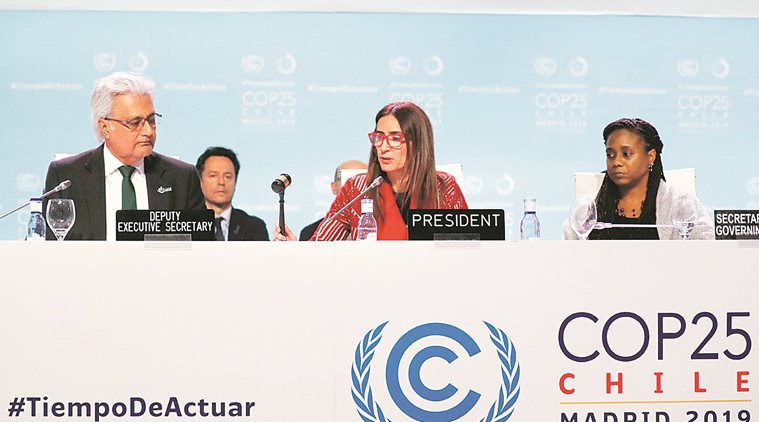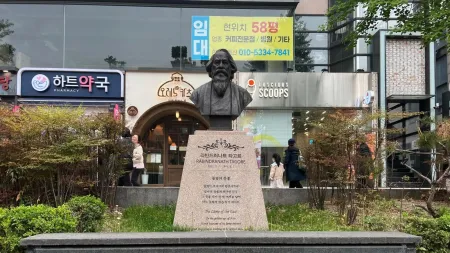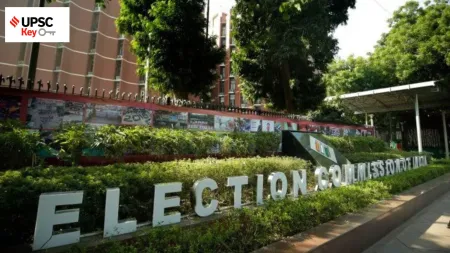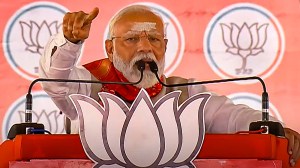- India
- International
Longest UN climate talks end with no decision about key issue on agenda
Details of new carbon market postponed to next summit; after objections over draft agreement, final text lacks specifics
 Carolina Schmidt, president of the UN Climate Change Conference (COP25), closes the summit in Madrid. (Reuters)
Carolina Schmidt, president of the UN Climate Change Conference (COP25), closes the summit in Madrid. (Reuters)
The longest-ever climate conference delivered probably the weakest outcome ever. The two-week Madrid climate conference could produce an agreement only after removing everything that any country objected to from the final text, and postponing all decisions on the only major agenda item it had to finalise.
After several countries rejected the draft agreement texts that were prepared on Saturday morning, the conference had little option but to remove all contentious phrases and provisions, and produce an agreement that was mired in generalities and lacked any specific decisions.
The issue of framing rules for setting up a new carbon market under Paris Agreement, the only big issue to be finalised in Madrid, was deferred entirely to next year, as no country was willing to budge from their stated positions.
UN Secretary General Antonio Guterres echoed the mood of many after the conference, saying in a statement: “I am disappointed with the results of COP25 (the 25th edition of Conference of Parties to the UN Framework Convention on Climate Change, the official name of Madrid talks). The international community lost an important opportunity to show increased ambition on mitigation, adaptation and finance to tackle the climate crisis. But we must not give up, and I will not give up.”
Uphill task for next year after little achieved in Madrid
The result from Madrid means negotiators face an uphill task next year to complete all the unfinished tasks ahead of the transition of the global climate regime from the 1997 Kyoto Protocol to the 2015 Paris Agreement. With the Paris Agreement set to come into effect next year, the rules of the new carbon market will have to be finalised soon. Moreover, with latest studies showing the world needs to do even more than what the Paris pact mandates, countries will be under pressure to increase their commitments.
Civil society groups, an important and vocal stakeholder in the negotiations, reacted with anger and disappointment at the outcome of what was the longest ever climate talks. The two-week year-end conference was supposed to end by Friday evening, but continued till Sunday afternoon.

“I have been attending these climate negotiations since they first started in 1991. But never have I seen the almost total disconnect we’ve seen here at COP25 in Madrid between what the science requires and what the climate negotiations are delivering in terms of meaningful action,” said Alden Meyer, director of policy and strategy at the Union of Concerned Scientists, an independent scientific group. “Governments need to completely rethink how they do this, because the outcome of COP25 is totally unacceptable,” said Jennifer Morgan of Greenpeace International.
Apart from framing the rules for a new carbon market, the Madrid talks was expected to direct all countries to increase their climate actions in view of recent scientific assessments that show the world was not doing enough to prevent the extreme impacts of climate change. Some countries, especially the most vulnerable ones like small island states, were pushing for language directing all countries to update their climate action plans by next year to reflect the new realities. Such demands were resisted mainly be big developing countries like China, India and Brazil, which had been arguing that countries be asked to deliver on their past and current promises before being asked to make any new commitments. These developing countries repeatedly pointed out that the current situation was a direct result of developed countries not meeting their targets in the pre-2020 period, and has demanded an assessment of the performance of developed countries on climate action, including their obligation to provide finance and technology to the developing world.
The final agreement included a general call stressing “the urgency of enhanced ambition” by all countries. There was no direction to update climate action plans by next year. Similarly, the demand of developing countries, reflected in the earlier drafts in the form of a provision setting up a two-year work programme to assess the performance of developed countries, was also not included in the final agreement.
Even something as innocuous as acknowledging the special reports of the Intergovernmental Panel on Climate Change (IPCC) had run into trouble. Some countries had objected to the fact that an earlier draft mentioned IPCC’s report on oceans but ignored the report on land, both having come out this year. The final agreement thus dropped the names of both the reports and only expressed its “appreciation and gratitude” to the IPCC for coming out with the two special reports.
Harjeet Singh, ActionAid’s global lead on climate change, blamed the US for the weak outcome from Madrid. The US had decided to pull out of the Paris Agreement and will cease to be a member from next November.
“The United States has once again gotten its way through bullying and tricks. They came here in bad faith, acting only to protect their interests and those of the polluting industries that caused climate emergency,” Singh said.
May 08: Latest News
- 01
- 02
- 03
- 04
- 05









































